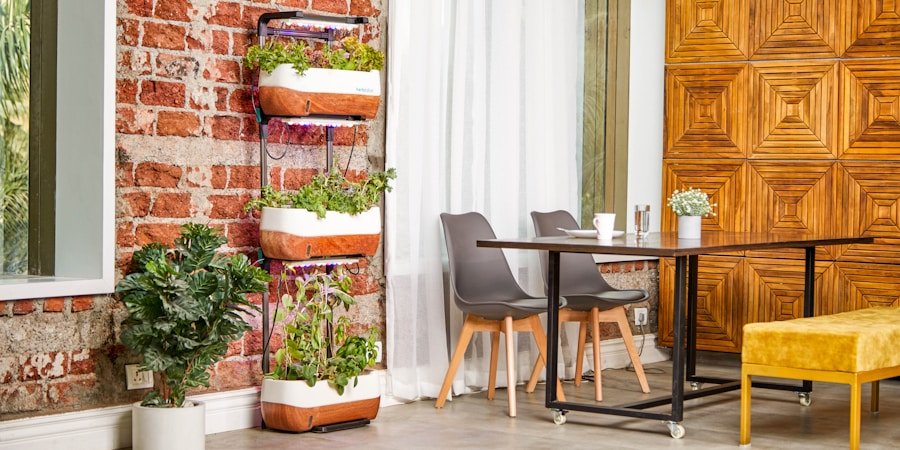When selecting plants for your bedroom to enhance sleep quality, it is essential to consider several key factors. Primarily, choose plants renowned for their air-purifying and oxygen-producing capabilities. Notable options include snake plants, peace lilies, and aloe vera, which not only enhance bedroom aesthetics but also improve air quality, leading to a more restful night’s sleep.
In addition to air-purifying plants, consider incorporating species known for their calming and relaxing properties. Lavender, jasmine, and chamomile are excellent choices that can create a soothing atmosphere in your bedroom. These plants are visually appealing and emit natural scents that promote relaxation, reduce stress, and are ideal for any bedroom environment.
Key Takeaways
- Choose plants with calming scents and air-purifying qualities for the bedroom
- Plants can improve air quality, reduce stress, and promote relaxation for better sleep
- Place plants in well-lit areas and water them regularly to ensure their health
- Avoid plants with strong scents or potential allergens to prevent sleep disturbances
- Use plants as natural decor elements to create a tranquil and soothing bedroom environment
Understanding the benefits of plants for better sleep
Air Purification and Oxygen Boost
Studies have shown that being surrounded by nature, even in the form of indoor plants, can help to reduce stress and anxiety, leading to a more restful night’s sleep.
Natural Sedatives for a Peaceful Environment
In addition, certain plants, such as lavender and jasmine, have been found to have natural sedative properties, making them ideal choices for the bedroom. By incorporating these plants into your bedroom decor, you can create a peaceful and serene environment that is conducive to better sleep.
Therapeutic Benefits and Connection to Nature
Furthermore, having plants in the bedroom can also help to improve overall well-being. The act of caring for plants can be therapeutic in itself, providing a sense of purpose and accomplishment. Additionally, the presence of greenery in the bedroom can help to create a connection to nature, which has been shown to have a positive impact on mental and emotional health. Overall, the benefits of having plants in the bedroom for better sleep are far-reaching and can have a significant impact on your overall quality of life.
Proper placement and care for bedroom plants
Once you’ve chosen the right plants for your bedroom, it’s important to consider their placement and care in order to ensure they thrive and promote better sleep. When it comes to placement, it’s best to position your plants near windows or other sources of natural light, as this will help them to photosynthesize and grow properly. Additionally, be mindful of the temperature and humidity levels in your bedroom, as certain plants may require specific environmental conditions in order to thrive.
In terms of care, it’s important to water your plants regularly and provide them with the appropriate nutrients. Be sure to research the specific needs of each plant you choose and create a care routine that works for you. Additionally, it’s important to periodically check your plants for signs of pests or disease and take appropriate action if necessary.
By properly placing and caring for your bedroom plants, you can ensure that they not only look beautiful but also contribute to a healthier and more restful sleep environment.
Avoiding potential allergens and toxins in bedroom plants
| Plant Name | Benefits | Care Tips |
|---|---|---|
| Lavender | Promotes relaxation and reduces stress | Place in a sunny spot, water sparingly |
| Aloe Vera | Improves air quality and emits oxygen at night | Requires bright, indirect sunlight and minimal watering |
| Jasmine | Reduces anxiety and improves sleep quality | Needs bright light and regular watering |
| Snake Plant | Filters air and releases oxygen at night | Tolerates low light and requires infrequent watering |
While incorporating plants into your bedroom decor can have numerous benefits, it’s important to be mindful of potential allergens and toxins that certain plants may produce. Some individuals may be sensitive to pollen or other allergens produced by certain plants, so it’s important to research the potential allergenic properties of any plant you’re considering for your bedroom. Additionally, some plants may release toxins into the air, which can be harmful if inhaled over time.
Be sure to research the potential toxicity of any plant before bringing it into your bedroom. To minimize the risk of allergens and toxins in your bedroom plants, consider opting for low-allergen and non-toxic varieties. Additionally, be sure to keep your plants well-maintained and free from pests or disease, as these issues can exacerbate any potential allergens or toxins.
By being mindful of potential allergens and toxins in your bedroom plants, you can ensure that they contribute to better sleep without causing any adverse health effects.
Incorporating plants into bedroom decor for improved sleep
Incorporating plants into your bedroom decor is a great way to enhance the overall ambiance and promote better sleep. When choosing where to place your plants, consider areas that could benefit from a touch of greenery, such as bedside tables, dressers, or shelves. You can also get creative with hanging planters or wall-mounted planters to add visual interest and depth to your bedroom decor.
In addition to placement, consider how different types of plants can complement your existing decor style. For example, if you have a minimalist or modern bedroom, you may want to opt for sleek and simple planters that complement the clean lines of your furniture. On the other hand, if you have a more bohemian or eclectic style, you may want to incorporate a variety of plant types and textures for a more eclectic look.
By thoughtfully incorporating plants into your bedroom decor, you can create a peaceful and calming environment that is conducive to better sleep.
Creating a peaceful and calming bedroom environment with plants
Visual Interest and Depth
When it comes to creating a calming atmosphere with plants, consider incorporating a variety of plant types and sizes to add visual interest and depth to your space. You can also experiment with different planters and containers to add texture and dimension to your bedroom decor.
The Power of Plant Scents
In addition to aesthetics, consider how different plant scents can contribute to a calming atmosphere in your bedroom. Lavender, chamomile, and jasmine are all known for their relaxing properties and can help create a soothing environment that promotes better sleep. You can also experiment with essential oils or candles with natural plant scents to enhance the calming effects of your bedroom plants.
Creating a Peaceful Environment
Overall, by thoughtfully incorporating a variety of plants into your bedroom decor, you can create a peaceful and calming environment that is conducive to better sleep. Whether you opt for air-purifying plants or those with natural sedative properties, the presence of greenery in your bedroom can have a significant impact on your overall well-being.
Tips for maintaining healthy and thriving bedroom plants
Once you’ve incorporated plants into your bedroom decor, it’s important to maintain their health and ensure they thrive in order to promote better sleep. One key tip for maintaining healthy bedroom plants is to establish a regular watering schedule based on the specific needs of each plant. Some plants may require more frequent watering than others, so be sure to research the individual needs of each plant in order to create an appropriate care routine.
In addition to watering, be sure to provide your plants with adequate sunlight and nutrients in order to promote healthy growth. Consider rotating your plants periodically to ensure they receive even sunlight exposure on all sides. You may also want to consider using natural fertilizers or plant food to provide your plants with the necessary nutrients for optimal growth.
Finally, be mindful of any signs of pests or disease in your bedroom plants and take appropriate action if necessary. Regularly inspecting your plants for any issues can help prevent potential problems from escalating and ensure that your plants remain healthy and thriving. By following these tips for maintaining healthy bedroom plants, you can create an environment that promotes better sleep while enjoying the beauty and benefits of indoor greenery.
In conclusion, caring for plants in the bedroom is an excellent way to promote better sleep while enhancing the overall ambiance of your space. By choosing the right plants based on their air-purifying and calming properties, understanding their benefits for better sleep, properly placing and caring for them, avoiding potential allergens and toxins, incorporating them into your decor thoughtfully, creating a peaceful environment with them, and maintaining their health effectively, you can enjoy the numerous benefits that indoor greenery has to offer. Whether you opt for air-purifying varieties or those with natural sedative properties, incorporating plants into your bedroom decor is sure to have a positive impact on your overall well-being and quality of sleep.
So go ahead and bring some greenery into your bedroom – you’ll be amazed at the difference it can make!
FAQs
What are the best plants for promoting better sleep in the bedroom?
Some of the best plants for promoting better sleep in the bedroom include lavender, jasmine, aloe vera, snake plant, and peace lily. These plants are known for their calming and air-purifying properties, which can help create a more relaxing environment for better sleep.
How can I care for plants in the bedroom to ensure they promote better sleep?
To care for plants in the bedroom to ensure they promote better sleep, it’s important to place them in locations with adequate sunlight and water them regularly. Additionally, it’s important to keep the plants free from dust and pests to maintain their air-purifying properties.
Are there any plants that should be avoided in the bedroom for better sleep?
Yes, there are some plants that should be avoided in the bedroom for better sleep. Plants such as cacti and succulents, which release carbon dioxide at night, may not be ideal for the bedroom as they can disrupt sleep patterns.
Can plants in the bedroom improve air quality and promote better sleep?
Yes, plants in the bedroom can improve air quality and promote better sleep. Certain plants have air-purifying properties that can remove toxins from the air, creating a healthier environment for sleep. Additionally, the presence of plants can also have a calming and relaxing effect, which can contribute to better sleep.






